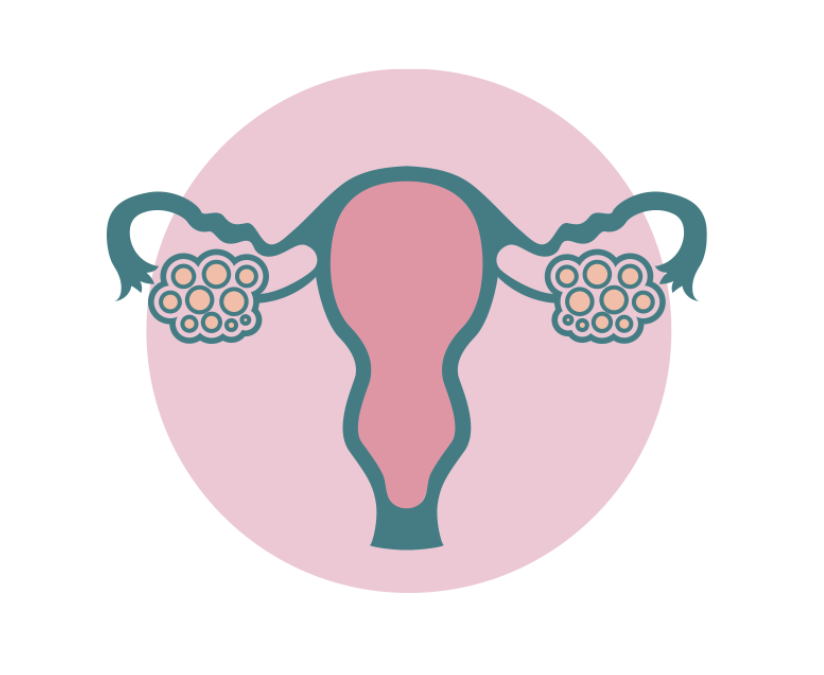What is PCOS
PCOS stands for Polycystic Ovarian Syndrome. It is quite a common diagnosis that women receive from their doctors and affects 10% of all women. As the name suggests, it is a syndrome, meaning a group of symptoms make up the condition. Let’s take a deeper look at the main PCOS symptoms, how you can get a true diagnosis, and what you can do to relieve the symptoms at home.
Symptoms of PCOS
The main ones that cause women to go to their doctor initially are irregular periods, weight gain and facial hair. Here is a more definitive list:
• Irregular periods, which can end up being no periods at all for some women
• Weight gain
• Blood sugar dysregulation, which can show up as mad sugar cravings, lightheadedness etc
• Male pattern hair growth in women, so hair growing on the face, back and buttocks.
• Losing your hair rapidly
• Acne, especially around the hairline
• Difficulty getting pregnant and other fertility issues
There can be other symptoms too, the above are the most common, but every individual is different.
How is PCOS diagnosed?
PCOS can’t be diagnosed without a full medical history and some appropriate pathology testing. This does not include ultrasound; let’s see why.
Ultrasounds and PCOS
‘An ultrasound cannot be a stand-alone diagnostic tool where PCOS is concerned because female ovaries are dynamic and constantly changing. They can look like they have cysts in a healthy, well-functioning cycle when the ‘cysts’ are normally developing follicles. If ovulation does not occur (which can be due to many different factors), the follicles will grow slightly more and look even more cyst-like. The issue is the lack of ovulation, not the presence of multiple follicles, which is why ultrasounds can’t be used as a diagnosis for PCOS.’
Essentially, PCOS is an ovulation issue. If you have it, you are not ovulating, which causes a build-up of male hormones called androgens. This is what gives rise to the symptoms of PCOS. To get a correct diagnosis, you need all three of these criteria:
1. Irregular cycles -> or an ultrasound that shows polycystic ovaries due to not ovulating
2. Pathology testing for androgens that shows they are high
3. Androgen excess is not due to any other reason; your doctor will rule this out to diagnose PCOS
So you’ve been diagnosed with PCOS, now what?
Like all health conditions, the driving factor behind them can be different for each individual. With the help of a Naturopath, you can discover what drives your PCOS, which will dictate what measures you can take to reduce your symptoms and get your health back on track.
In saying that, the following lifestyle measures will aid most types of PCOS.
1. Reduce simple carbs in your diet. This means reducing or removing sugar and all white foods, such as white rice, white bread, white pasta, and bakery goods. Instead of these foods, focus on adding things like sweet potatoes with dinner and quinoa or buckwheat instead of rice and pasta. Here are some food ideas:
Breakfast
• eggs cooked with veggies
• Gluten-free bread with thick avocado
• Fruit and natural yoghurt sprinkled with seeds
Lunch
• Leftovers from dinner!!
• Salad with feta and a tin of tuna or salmon
Dinner
• Meat with sweet potato and greens drizzled in olive oil
• Quinoa with curry lentils and feta
• Buckwheat pasta with bolognaise sauce filled with meat and grated veggies
2. Try gentle intermittent fasting by restricting your eating window to 8 to 10 hours each day. This means that once you have eaten your breakfast at 9am, you would have lunch at 1 to 2pm and eat dinner by 6pm. The last meal of your day needs to contain protein, healthy carbs like sweet potato, and healthy fats like avocado or olive oil so you can avoid feeling too hungry to fast overnight. After dinner at 6pm, there would be no more eating until breakfast the next day.
3. Movement. Exercise is so important for health, especially where hormones are concerned. It helps to reduce insulin resistance and improve energy and functioning of the body as a whole. Things like yoga, pilates, walking and strength training 3 times per week are great options.
4. Magnesium supplementation can be so beneficial for PCOS, especially if it’s coupled with insulin resistance. This is because it improves insulin sensitivity, among many other great benefits. Ask your naturopath for the correct form of magnesium for you.
5. Stress management – this is huge in all area’s of health, and particularly so where hormones are concerned. You can start to manage your stress load with daily practices like meditation, gratefulness and spending time in nature.
If this article resonates with you and you’d like a personalised plan to treat your PCOS, please book in HERE today. I look forward to helping you on your health journey.

